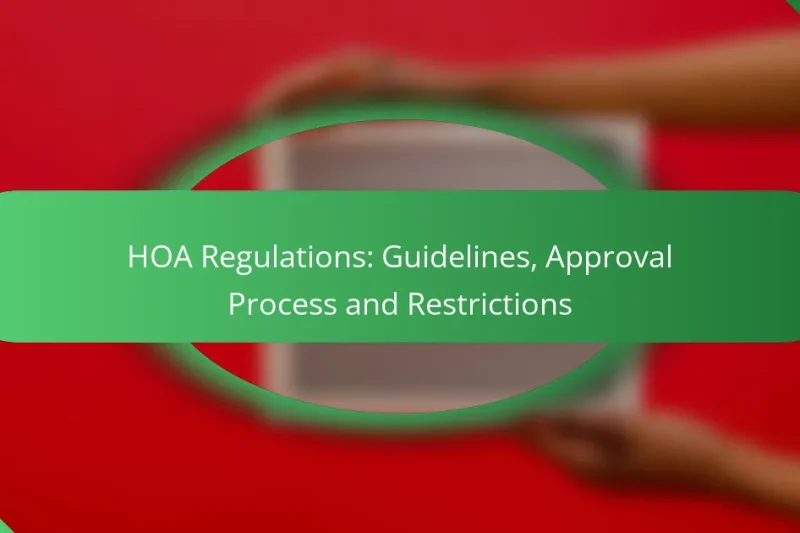Understanding local building codes is crucial for anyone involved in construction, as these regulations differ by … Local Building Codes: Compliance, Requirements and UpdatesRead more
Home Renovation Permits and Regulations
Home renovation permits are essential in Canada to ensure that renovations comply with local building codes and safety regulations. Homeowners must apply for various permits, including building, electrical, and plumbing, through their local municipality, with processes varying by region. Understanding the associated costs and requirements is crucial for a smooth renovation experience.
HOA Regulations: Guidelines, Approval Process and Restrictions
Homeowners’ Associations (HOAs) play a crucial role in regulating community living by enforcing guidelines that address … HOA Regulations: Guidelines, Approval Process and RestrictionsRead more
Common Permit Mistakes: Delays, Costs and Solutions
Common permit mistakes can result in costly delays and complications during the permitting process in Canada. … Common Permit Mistakes: Delays, Costs and SolutionsRead more
Home Renovation Permits: Application Process, Fees and Timelines
Obtaining home renovation permits in Canada is a crucial step to ensure compliance with local building … Home Renovation Permits: Application Process, Fees and TimelinesRead more
DIY Renovation Compliance: Regulations, Best Practices and Resources
Embarking on a DIY renovation project requires a solid understanding of the regulations that govern such … DIY Renovation Compliance: Regulations, Best Practices and ResourcesRead more
Zoning Changes: Requirements, Process and Implications
Zoning changes are essential for adapting land use regulations to meet community needs and development goals. … Zoning Changes: Requirements, Process and ImplicationsRead more
Inspections: Importance, Frequency and Compliance Standards
Inspections play a vital role in Canada by ensuring that businesses and organizations comply with safety … Inspections: Importance, Frequency and Compliance StandardsRead more
What home renovation permits are required in Canada?
In Canada, various home renovation permits are necessary to ensure compliance with local building codes and safety regulations. These permits typically include building, electrical, plumbing, demolition, and renovation-specific permits, each serving distinct purposes in the renovation process.
Building permits
Building permits are essential for most structural changes to a home, such as adding rooms, altering load-bearing walls, or constructing decks. These permits ensure that the renovation meets safety and zoning standards set by local authorities.
To obtain a building permit, homeowners must submit detailed plans and specifications for the proposed work. Fees can vary widely depending on the project’s scope and location, often ranging from a few hundred to several thousand Canadian dollars.
Electrical permits
Electrical permits are required for any significant electrical work, including rewiring, adding circuits, or installing new electrical fixtures. This permit ensures that all electrical installations comply with the Canadian Electrical Code.
Homeowners should hire a licensed electrician to perform the work and apply for the permit. Failing to obtain an electrical permit can lead to safety hazards and complications when selling the home.
Plumbing permits
Plumbing permits are necessary for major plumbing changes, such as installing new pipes, fixtures, or drainage systems. These permits ensure compliance with local plumbing codes and standards.
Similar to electrical work, it is advisable to hire a licensed plumber to handle the installation and permit application. Not having a plumbing permit can result in costly repairs and fines.
Demolition permits
Demolition permits are required when removing part or all of a structure. This permit ensures that the demolition is conducted safely and that any hazardous materials, such as asbestos, are properly managed.
Homeowners must provide a detailed plan of the demolition process and may need to notify neighbors or local authorities. Costs for demolition permits can vary based on the extent of the work and local regulations.
Renovation-specific permits
Renovation-specific permits may be required for specialized projects like home additions, swimming pools, or significant landscape alterations. These permits address unique aspects of the renovation that standard building permits may not cover.
Homeowners should consult with local building departments to determine if additional permits are necessary for their specific renovation projects. Being proactive about obtaining the right permits can prevent delays and legal issues down the line.
How to apply for home renovation permits in Canada?
To apply for home renovation permits in Canada, homeowners typically need to submit an application to their local municipality. This process can vary by province and city, so it’s essential to check specific local regulations and requirements.
Online application processes
Many municipalities in Canada offer online application processes for home renovation permits. Homeowners can visit their local government’s website to find the appropriate portal, where they can fill out the necessary forms and submit required documents electronically.
Online applications often streamline the process, allowing for faster approvals. However, it’s crucial to ensure that all information is accurate to avoid delays or rejections.
In-person application steps
If online applications are not available or preferred, homeowners can apply in person at their local municipal office. This typically involves filling out a paper application form and submitting it along with any required documentation.
When applying in person, it’s advisable to schedule an appointment if possible, as this can reduce wait times. Be prepared to discuss your renovation plans with a municipal official who can provide guidance on compliance with local building codes.
Required documentation
When applying for a home renovation permit, several documents are usually required. Commonly needed items include a completed application form, detailed plans of the proposed renovations, and proof of ownership.
Additional documentation may include structural engineering reports, zoning compliance letters, and environmental assessments, depending on the scope of the project. Always check with your local municipality for a comprehensive list of required documents to ensure a smooth application process.
What are the costs associated with home renovation permits?
The costs associated with home renovation permits can vary significantly based on location, project scope, and specific local regulations. Generally, these costs include permit fees, inspection fees, and potential additional costs for revisions or changes to the project.
Permit fees
Permit fees are typically the primary expense when obtaining a renovation permit. These fees can range from a few dozen to several hundred dollars, depending on the complexity of the project and the municipality’s fee structure. For instance, a simple interior renovation might incur lower fees compared to a major structural change.
It’s advisable to check with your local building department for a detailed fee schedule, as some areas may have flat rates while others calculate fees based on project valuation. Always factor these costs into your overall renovation budget.
Inspection fees
Inspection fees are charged for the required evaluations conducted by local officials to ensure compliance with building codes and safety standards. These fees can vary, often falling within the range of $100 to $300 per inspection, depending on the type and number of inspections needed.
Keep in mind that multiple inspections may be required throughout the renovation process, especially for larger projects. Planning for these costs in advance can help prevent budget overruns.
Additional costs for revisions
Revisions to your renovation plans can lead to additional costs, particularly if they require new permits or inspections. If you decide to change your project scope after the initial permit is issued, you may incur fees for revising the permit application and additional inspection fees.
To minimize these costs, ensure your plans are thoroughly vetted and finalized before submitting for permits. Communicating clearly with contractors and local authorities can also help avoid unexpected expenses related to changes.
What regulations govern home renovations in Ontario?
In Ontario, home renovations are primarily governed by the Ontario Building Code, local zoning bylaws, and heritage preservation regulations. Understanding these regulations is crucial for homeowners to ensure compliance and avoid potential fines or project delays.
Ontario Building Code
The Ontario Building Code (OBC) sets the minimum standards for construction and renovation in the province. It covers aspects such as structural integrity, fire safety, and accessibility, ensuring that buildings are safe and habitable.
Before starting a renovation, homeowners should review the OBC to determine which sections apply to their projects. For example, significant changes to plumbing or electrical systems typically require adherence to specific OBC standards and may necessitate permits.
Local zoning bylaws
Local zoning bylaws dictate how properties can be used and what types of renovations are permissible in specific areas. These regulations can vary significantly between municipalities, affecting factors like building height, lot coverage, and setbacks from property lines.
Homeowners should consult their local municipal office or website to understand the zoning bylaws applicable to their property. Engaging with local authorities early in the renovation process can help avoid costly changes later on.
Heritage preservation regulations
Heritage preservation regulations apply to properties designated as heritage sites or located in heritage conservation districts. These regulations aim to protect the historical and cultural significance of buildings, often requiring special permits for renovations.
Homeowners with heritage properties should consult their municipality’s heritage committee or planning department to understand the specific requirements. It is essential to consider these regulations early in the planning process to ensure that renovations respect the property’s historical value.
What are common mistakes when applying for renovation permits?
Common mistakes when applying for renovation permits include submitting incomplete applications and ignoring local regulations. These errors can lead to delays, additional costs, or even permit denials.
Incomplete applications
Submitting an incomplete application is a frequent mistake that can stall your renovation project. Ensure all required documents, such as plans, specifications, and proof of ownership, are included before submission.
To avoid this pitfall, create a checklist of necessary documents and double-check your application against local requirements. Missing even a small detail can result in significant delays, so thoroughness is key.
Ignoring local regulations
Ignoring local regulations can lead to serious consequences, including fines and the need to redo work. Each municipality has specific codes and zoning laws that must be adhered to, so familiarize yourself with these before starting your project.
Consult local building authorities or a licensed contractor to ensure compliance with all regulations. This proactive approach can save time and money, preventing costly adjustments later in the renovation process.






